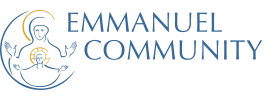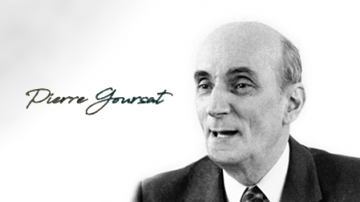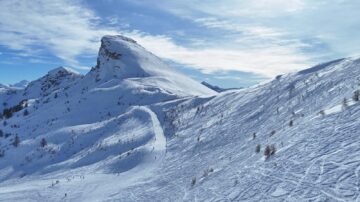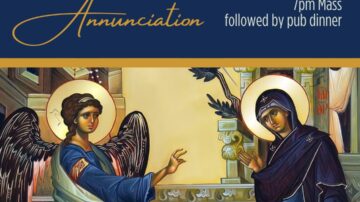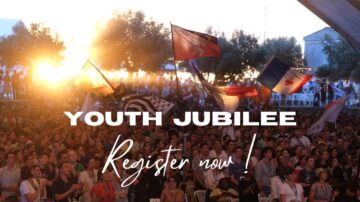At the end of 2020, 5 years after the Encyclical Laudato Si publication, Pope Francis declared a Laudato Si year. It is time for us to see where we got and what we learned in the past five years. There are numerous initiatives, books, workshops, and reflection groups on this topic, and we are grateful for every single initiative. We have started with eco cups and plates for our Community Weekends and during our significant events (when they were still possible, of course), and we tried, step by step, to do a bit more. Every small initiative is a step forward.

Today, we would love to present you two projects borne with the Emmanuel Community’s support to respond to Pope’s call to take care of our planet by an integral ecology and agriculture.
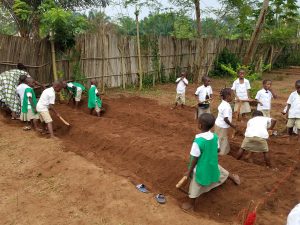
The first project is created by the Fr. Nestor Attomatoun in Bénigbe (Benin) starting in 2017. On the fringe of the publication by Pope Francis of the Laudato Si encyclical, Father Nestor Attomatoun, with the support of the Emmanuel Community of which he is a member, took the initiative of an integral ecology project in response to the Holy Father’s call for the preservation of nature.
Upon his arrival in this parish in October 2015, the priest struggled with the parishioners’ misery and the growing unemployment rate, the new parish priest, imbued with the meditation of Pope Francis’ Laudato Si’ encyclical on the environment and encouraged by his bishop, Mons. Aristide Gonsallo undertook to restore hope to his parishioners by instilling in them the land’s wealth values. It is what he calls the “pastoral care of development in the light of Laudato Si”: “Poor countries must have as a priority the eradication of misery and the social development of their inhabitants. The parish priest’s first social act is the construction of a borehole and a water tower. As the encyclical states, “access to safe drinking water is a primordial, fundamental and universal human right, because it determines people’s survival, and is therefore a condition for the exercise, of other human rights.”
With the water problem solved, the urgency to carry out agricultural pastoral care is felt, not without difficulty. Although Benin is a fertile land (the country has the Ouémé valley, the second most fertile valley in the world after the Nile valley) and water is easily accessible, agricultural activity is not a priority. To raise awareness and train the younger generations, the parish priest plans to create a farming school under the Emmanuel Community’s supervision.
Father Nestor is looking for a way to rally his parish to the agricultural cause. It was then that he asked the NGO Fidesco to send volunteers to support him. The idea is to create a solidarity farm on the 10 hectares of the parish’s unexploited land. Arriving in August 2016 with their three children aged 9, 7, and 3, Pierre and Marine Wemaere started this ambitious project by setting up a team of about fifteen people.

This Laudato Si’ farm aims to recruit and train the parishioners to work the land and make them aware of the need to respect the environment. Permaculture starts to promote biodiversity. The cultivation of medicinal plants allows people to treat themselves, particularly a very useful plant in preventing and treating malaria: artemisia. The use of chemical fertilizers is prohibited, and awareness-raising activities for waste treatment happen regularly.
In Banigbé, Laudato Si’ has a wide range of applications! “We place all these activities under the protection of the Father Creator through this prayer of Pope Francis,” concluded Father Nestor and the Fidesco volunteers.
This School-farm is a source of revenue for several single mothers. Working there helps them be autonomous and fight against hunger and teach their children the value of the earth and work. It also gives them the space to support others and send their children to school.
This project is already bearing beautiful fruits of communion and fraternity, so necessary for integral development. This communion is fostered and maintained by the dynamics of encounters at several levels: firstly, intercultural encounters in the exchanges between the French Fidesco volunteers and the “mothers of the farm” who are well steeped in their African culture; secondly, encounters between generations, since all ages come together daily in this project: school children, young teachers, widows from the farm.
This project is aptly named Laudato Si because all those involved are committed to a joint project that makes sense: serving God through the most vulnerable in a setting where nature and beauty are at the center. In short, in summing up, we state with conviction that this project is the work of the Holy Spirit who has been able to find favorable ground for the implementation of the challenges of the Laudato Si encyclical in an African context.
( After an article published in IL EST VIVANT no.335 and another on the website La Croix Africa)
The second project – Terre de Promesse- was launched in 2020 in Chezelle ( France). Its vocation is to propose a new Laudato Si’ art of living anchored in a rural reality, around the Île Bouchard sanctuary and the Chézelles and Marigny guest houses, to bear witness to an integral ecological conversion.

Terre de promesse includes three missions:
To develop agricultural activities (market gardening and livestock farming) on land currently dormant through agro-ecological practices that respect Creation, and market the product in short circuits.
– To use the agricultural activity as a support for social and professional integration by developing an integration site enabling people who are far from employment to find work.
– To develop training and education actions in integral ecology: the reception of groups, spiritual retreats, conferences, training courses, seminars, etc. ¨
In 2016, a meeting of the Emmanuel priests took place in Lisieux. They discussed the latest Encyclical of the Pope and the idea of the project started. A visit to the Bec Hellouin farm takes place in the presence of some community members. The meeting proved to be very inspiring and led Laurent Landete, then Emmanuel moderator, to schedule a new appointment, at L’île Bouchard, in the presence of several bishops, Régis Dubourg, member of the Chemin Neuf and general director of the permanent assembly of the Chambers of Agriculture, and Thierry François, a founding member of the Journées paysannes. One of the questions raised during this meeting was how to enhance the Emmanuel Community’s properties to make the model virtuous places in Laudato Si’s spirit. A reflection starts then regarding the agricultural land around L’Île Bouchard.
Terre de Promesse participates both in the indispensable ecological and social transition that will enable us to safeguard our “common home” and the Creation of sustainable and non-relocatable jobs to contribute to economic recovery.
Creating jobs by sustainably cultivating our land and by offering organic products in a short circuit resonates even more strongly in our ears today! We firmly believe that in the face of the fear, the anguish that can invade us in this period, we must oppose another emotion with an inversely equal driving force: JOY.
